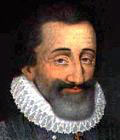 |
Henri IV
b. 13 Dec 1553, Pau, Béarn, Navarre [1]
d. 14 May 1610, Paris, France |
| Title: |
Par la grâce de Dieu, Roi de France et de Navarre = Dei Gratia Francorum et Navarrae Rex (By the Grace of God, King of France and Navarre) |
| Term: |
2 Aug 1589 - 14 May 1610 |
| Chronology: |
2 Aug 1589,
succeeded to the throne |
|
27 Feb 1594, consecrated and crowned, cathédrale Notre-Dame, Chartres [2] |
|
30 Mar 1594, recognized as King of France by the Parlement de Paris |
|
14 May 1610, died (assassination) [3] |
| Names/titles: |
Private name: Henri de Bourbon; duc de Vendôme (duke of Vendôme) [from 17 Nov 1562]; |
| Other offices: |
Roi de Navarre (king of Navarre) as Henri III [9 Jun 1572 - 14 May 1610] |
| Biography: |
| The son of Antoine de Bourbon, duc de Vendôme, and Jeanne d'Albret, Queen of Navarre; inherited the throne of Navarre upon mother's death (9 Jun 1572); married (18 Aug 1572) Marguerite de France, daughter of King Henri II and Catherine de Médicis; through his father, was in the sole legitimate line of descent from the Capetian kings of France; became the heir presumptive to the throne of France following the death of Hercule-François de France duc d'Anjou (10 Jun 1584), the last surviving brother of King Henri III; was opposed by the Holy League unwilling to accept a Protestant king; excluded from the succession by the Treaty of Nemours (1585) between Henri III and the Holy League; defeated the French king's army at the Battle of Coutras (20 Oct 1587); sponsored the assassination of the League's leader, Henri Duke of Guise (23 Dec 1588); reconciled with Henri III and was proclaimed successor to the throne; succeeded upon the assassination of Henri III (2 Aug 1589); entered the war with the Holy League (La Sainte Ligue); won victories at Arques (1589) and Ivry (1590); laid unsuccessful sieges of Paris (1590) and of Rouen (1591-1592); undertook a conversion to Roman Catholicism (July 1593) and was crowned at Chartres (27 Feb 1594); entered Paris (22 Mar 1594) and was recognized by the Parlement de Paris (30 Mar 1594); declared war on Spain (1595) and undertook operations against the League and its Spanish allies, defeating them at Fontaine-Française (1595) and retaking Amiens (September 1597); agreed to the terms of the Peace of Vervins between France and Spain (2 May 1598); signed the Edict of Nantes, which confirmed Roman Catholicism as the state church (13 Apr 1598); after annulment of the marriage (1599) with Marguerite de France by pope Clementius VIII, married (27 Dec 1600) Maria de ' Medici (French: Marie de Médicis), daughter of grand-duke Francesco I of Tuscany; was assassinated in Paris (14 May 1610) by a fanatical Roman Catholic. |
| Biographical sources: "Henri IV", by Jean-Pierre Babelon (Paris: Fayard, 1982); "Henri IV", by François Bayrou (Paris: Flammarion, 1994); "Henry IV", by David Buisseret (London: Allen & Unwin, 1984); "Henry IV", by Janine Garrisson (Paris: Seuil, 1984); "Henry of Navarre: Henry IV of France", by Lord Russell of Liverpool (New York: Praeger, 1970); "The Conversion of Henry IV: Politics, Power and Religious Belief in Early Modern France", by Michael Wolfe (Cambridge: Harvard University Press, 1993). |
| |
| [1] |
Henri was born after 00:00 13 Dec 1553. See Babelon, Henri IV, p. 42: "… entre minuit et une heure dans la nuit du 12 au 13 décembre 1553 (et non le 14, comme on l'a dit souvent) que les douleurs saisirent la mère…" Cf. Choix de chroniques et mémoires sur l'histoire de France (Palma Cayet), ed. by J.A.C. Buchon (Paris: A. Desrez, 1836), 1:173. |
| [2] |
"L'ordre des ceremonies du sacre et couronnement du Treſ-Chreſtien Roy de France et de Navarre Henry quatrieſme du nom. Faict en l'Egliſe de Noſtre Dame de la ville de Chartres, le Dimanche 27. de Feurier, 1594." (Lyon: G. Jullieron et T. Ancelin, 1594) |
| [3] |
Mémoires-journaux de Pierre de L'Estoile (Paris: Librairie des bibliophiles, 1881), 10:218-219. |

